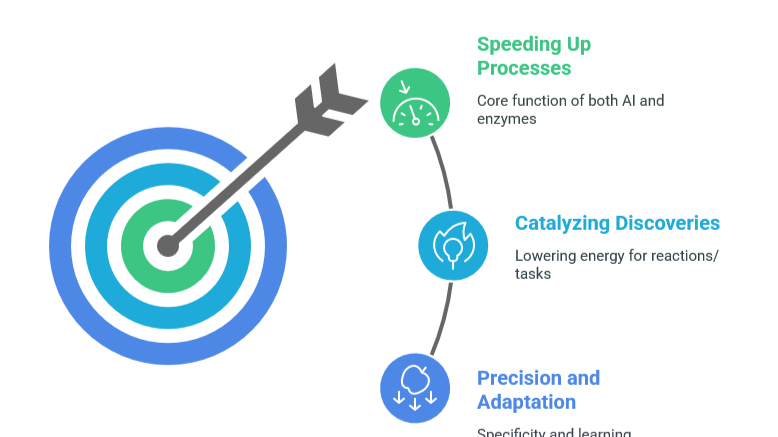AI is an Enzyme

I recently watched a TED Talk by Ngozi Elobuike, Ngozi Elobuike, MSc., M.A. where she described AI as an enzyme, and I loved it. But to understand how AI is an enzyme, I'll have to take you back to Biology 101 and define an enzyme.
What are Enzymes
These are biological catalysts that lower the energy required for a reaction to occur, meaning that with active enzymes, there is less strain on the body to perform its daily functions. For example, enzymes help break down the food you eat so your body can absorb nutrients quickly.
What is AI
The definition of AI has become a cliché, but by now, most of us understand that AI can assist us in brainstorming, writing, creating images, and even coding. AI systems can analyze vast amounts of data, recognize patterns, and make predictions or decisions much faster than humans can.
How AI acts like an Enzyme
Similarly to how enzymes help maintain the complex functions of the body by reducing the activation energy for reactions, AI can reduce the energy required for us to perform our work. This was vividly illustrated in the TED Talk, which inspired the writing of this article.
She was broke and living in her sister's house, where she started experimenting with ChatGPT as a brainstorming partner. She shared ideas, refined them, and successfully developed a startup plan. It would have taken her months to research and draft a feasible business plan, but with the activation energy reduced by ChatGPT, she was able to get started and launch her business. Today, she is one of the Global strategists on AI and owns a wine club, having launched two premium beverages. This transformative power of AI in Ngozi's life is a testament to its potential to catalyze change and enhance productivity.
Previously, when I wrote articles, I would start with a Google search, but I barely get past the first three pages, which limits the information I have access to. However, with AI, I can run a cross-section search across multiple AI platforms and then read through; this gives a deep-level overview of most of the information available on the topic on the internet. Then, I read through and write from my perspective, which creates a positive cycle enriching the data available on the LLMs. This practical application of AI in my work process demonstrates its potential to enhance productivity and efficiency.
Similarities between AI and Enzymes
- Speeding Up Processes: Just like enzymes speed up chemical reactions, AI speeds up complex tasks in science, medicine, and industry.
- Catalyzing Discoveries: Enzymes catalyze reactions by lowering the energy required for the reaction to occur. Similarly, AI reduces the "energy" or effort needed to solve problems by quickly analyzing data and predicting outcomes.
- Precision and Adaptation: Enzymes are exact, working only with specific molecules. AI also learns from data and adapts to improve its accuracy over time, providing a sense of security and trust in its performance.
Conclusion
AI is like an enzyme because it speeds up complex tasks, helps discover and design new tools, and adapts to improve outcomes, just as enzymes speed up and control life's chemical reactions. When you use AI for work, it's not doing the work for you. Instead, it catalyzes your work process, empowering you to understand, analyze, and synthesize more efficiently. This enzyme analogy helps us understand the role of AI in society, just as enzymes don't replace the fundamental processes of life but make them possible at the speed and scale needed for living organisms.
"AI doesn't replace human intelligence – it amplifies it."
References
- Meta AI - https://www.meta.ai/ (Writing Support)
- ChatGPT - https://chatgpt.com/ (Brainstorming)
- Claude AI - https://claude.ai/ (Writing Support)
- NapkinAI - https://www.napkin.ai/ (Image Creation)
Written by
Marketing Manager,
Zeta AI
